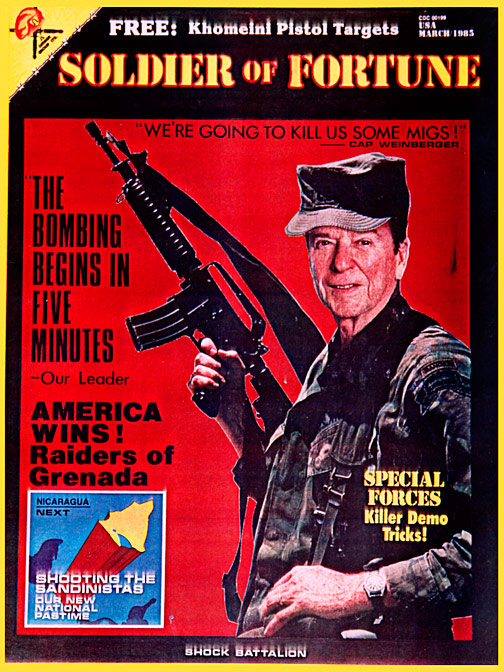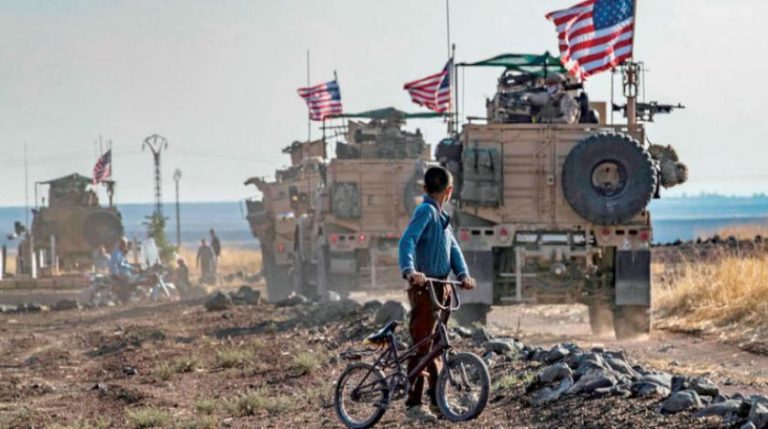by Jim Phillips
“It is well that war is so terrible, or we should grow too fond of it” — General Robert E. Lee, reflecting on the carnage of the Civil War, one of our nation’s bloodiest.
“In the counsels of government, we must guard against the unwarranted influence, whether sought or unsought, by the military-industrial complex. The potential for the disastrous rise of misplaced power exists and will persist.” — President Eisenhower (Supreme Allied Commander in World War 2) in his last presidential address to the nation, 1961.
Imperialism Is Not Cool
The United States has a long history of using its military to extend, directly or through proxies, its power and commercial-industrial interests. Eisenhower himself presided over the overthrow of the elected government of Iran in 1952 and the overthrow of the Guatemalan government in 1954, with the active encouragement of corporations. The cost was decades of the Shah’s oppressive rule and the Islamic reaction in Iran; and decades of murderous genocide against the majority Mayan population in Guatemala. President Kennedy presided over the military assistance that supported the invasion of Cuba at the Bay of Pigs in 1961. President Johnson sent the Marines into the Dominican Republic in 1965, and greatly expanded the war in Vietnam. Our military under President Nixon actively aided the murderous coup against elected Chilean President Salvador Allende on September 11, 1973, resulting in seventeen years of brutal military dictatorship. When planes took down the twin Trade Towers in New York in 2001, Chileans sent their condolences saying they had suffered their own 911 in 1973.
In the 1980s, President Reagan turned Honduras into “Battleship America,” with a large U.S. military presence designed to keep Honduras from going the way of revolutionary Nicaragua, and as a platform to train and arm a proxy force, the Contra, to invade and overthrow the Nicaraguan government. Not content with that, he used the U.S. military to sabotage and destroy port facilities along the Nicaraguan Pacific coast, causing much damage to life and the country’s economy. The result of all this was 30,000 Nicaraguan soldiers and civilians dead, thousands more injured physically and psychologically for life, and millions of dollars in loss. Reagan justified this with the absurd claim that Nicaragua—population then 3 million, one of the poorest countries in the hemisphere, with no functional air force—might contemplate invading the U.S., and was a serious threat to U.S. security.

Reagan also sent the military into tiny Grenada when he declared it a threat to the safety of Americans and the stability of the region. At the time, Errol Barrow—former Prime Minister of Barbados and a senior statesman of the Caribbean—quipped: “Here comes Reagan galloping out of the corral, guns blazing and looking for a fight.” President Bush Sr. sent the U.S. military into Panama to extradite one man, Manuel Noriega, who had been a faithful ally of the U.S. for years. The cost of that act was paid in Panamanian lives and property destruction.
This is a very partial list, and only in the Western Hemisphere; never mind the Middle East, Africa, and Southeast Asia. But such a history is becoming increasingly a source of embarrassment, both to many U.S. citizens and to people and governments elsewhere. It is a public relations problem. It also runs the risk of increasingly active popular resistance, both here and there. To assuage this concern, the government-military-industrial-tech-academic complex has been trying to make war more respectable. This will allow us to become even more fond of war, or at least not feel guilt and outrage at it—and to wage war by other means everywhere all the time. It is a strategy for disarming the anti-war movements, and we must pay attention to it. Ultimately, it will ensure that we cannot tell the difference between war and peace. The victims elsewhere of this “new normal” will certainly know, but we will be encouraged to forget about them.
The Rules of War
There have been past attempts to regulate warfare, to make it less deadly, to limit its disastrous effects, and to instill some sense of ethics or morality into a manifestly immoral exercise. These attempts have taken at least two forms. One is the effort to establish rules of warfare, or “rules of “engagement” to use the nicer description. Most of the major religions emphasized tolerance, love, and peace even as their traditions also allowed for “holy wars.” In the Middle Ages and after, theologians and scholars developed principles that would allow us to discern if any particular war was a “just war.”
We were told that we must not engage in unjust wars because these were an affront to our gods and our own humanity. But the temptation to portray self-interest as self-defense has always tempted humans. By the nineteenth century in Europe, at least, the assertion arose that nations could not be bound by the same ethics and morality as individual citizens. Anything was permissible if it served the “national Interest”—an idea that underpinned nazism and fascism in 1930s Europe and, later, the National Security Doctrine embraced by the U.S. that opened the door to the McCarthy Un-American Activities Committee’s reign of terror that assumed there were Communists everywhere. The military dictatorships of Latin America in the 1970s adopted the National Security Doctrine from European fascism and U.S. national security, and applied it more profoundly and brutally.
Out of the moral catastrophe of the Second World War came the Nuremberg Principles that re-stated the rights of people and nations at war, and what was forbidden. These became a basis for the prosecution of prominent Nazis after the war, and are still evoked today. U.S. combat veterans such as Brian Willson were part of the effort to stop the trains carrying shipments of weapons from the Concord naval base in California to the Contras in Nicaragua. Willson paid a price for this, losing both his legs and almost his life on the train tracks at Concord. These concerned veterans and other citizens called their campaign the Nuremberg Actions.
Throughout this long history, there have always been attempts through law and direct action to restrict war as an instrument of death, and counter forces wanting to expand war as an instrument of power. People kept pushing against “the potential for the disastrous rise of misplaced power.” The U.S. Army and other branches have their codes of military conduct, the manuals that direct how things should be done. Almost everyone warns, however, that in actual military operations, the rules are often abandoned, and people do terrible things they might never do in another context. Despite all our efforts to make warfare follow civilized rules, war changes humans, and not always for the better.
The Technology of War
Other attempts to regulate warfare, to limit its deadly effects, have focused on the technology of modern warfare. Human cultural evolution has brought many benefits to our species, but it has also brought increasingly effective ways of killing. In terms of basic morality, this is almost inevitably a race to the bottom, an arms race fueled by fear or greed. Indigenous tribal peoples of old may have engaged in deadly warfare, but the limits of their technology limited the deadliness of war. The Gatling gun, improvements in rifle design, the military aircraft, chemical and biological weapons in the nineteenth and early twentieth centuries exponentially increased the deadliness of warfare, an especially useful development for expanding empires. One imperial saying of that time goes: “Whatever happens, we have got the Gatling gun, and they [the natives] have not.” Nations and organizations tried to draft treaties and agreements to ban the use of chemical and biological warfare. Important as it was, that was only a partial fix. The Nazi forces, tanks, and bomber aircraft that invaded Poland in September,1939 met resistance from mounted cavalry and a tiny air force. A survivor of that decimated Polish air defense later said, “We knew it was all over before it began.”” The “just war” principles of waging war only for national defense, and proportionality (the response must be proportional to the offense) were shredded many times. Poland was no threat to Germany.
Then came the atom bomb, causing Albert Einstein to reflect: “Everything has changed but our way of thinking. And so we drift toward unparalleled disaster.” Since then, governments have developed increasingly effective forms of atomic and then nuclear weapons and the means to deliver them to the “enemy” faster and more effectively. At least four disastrous consequences have come from this. Two atom bombs killed many thousands in two Japanese cities; today’s nuclear weapons are many times more powerful. A nuclear arms race has resulted in the ability of some nations to destroy humanity and almost all life on the planet many times over. The testing of atomic and nuclear weapons, and even their manufacture has claimed many lives, the “collateral damage” of nuclear warfare. The people of the Marshall Islands in the Pacific, and other areas where atom bomb testing took place in the 1950s were victims of collateral damage—long term illness; pollution of their land, water, and food sources; destruction of much of their traditional way of life. Other activities to support the atomic arms race also endangered the health of peaceful populations, such as uranium mining on the lands of the Navajo Nation in the U.S. west. Many of these innocent victims of war have never been compensated.
Beyond all this,there is yet more collateral damage that was predicted by Eisenhower in his so-called Chance for Peace speech in 1953:
Every gun that is made, every warship launched, every rocket fired signifies, in the final sense, a theft from those who hunger and are not fed, those who are cold and are not clothed…This world in arms is not spending money alone. It is spending the sweat of its laborers, the genius of its scientists, the hopes of its children. This is not a way of life at all, in any true sense. Under the cloud of threatening war, it is humanity hanging from a cross of iron.



